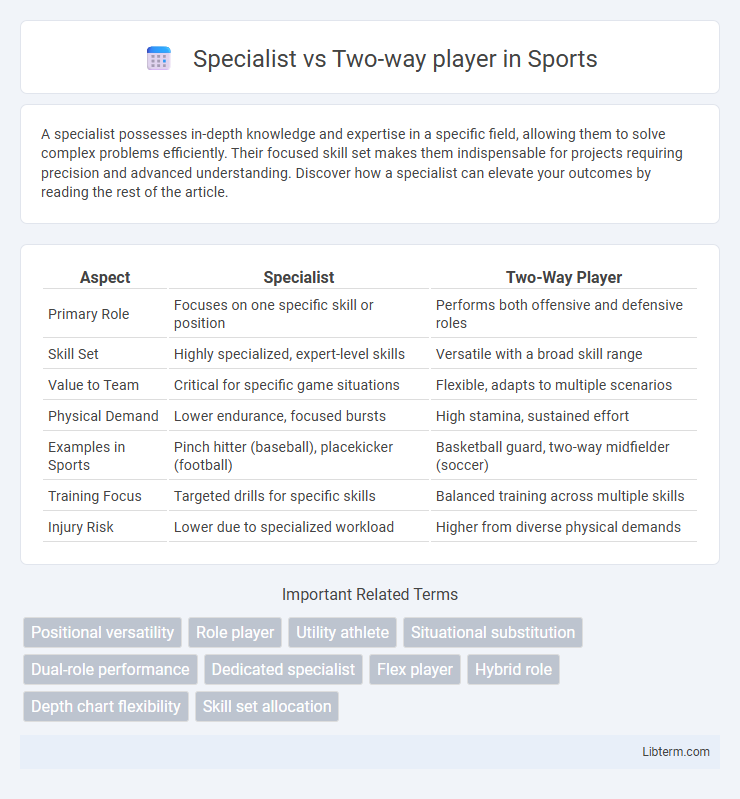A specialist possesses in-depth knowledge and expertise in a specific field, allowing them to solve complex problems efficiently. Their focused skill set makes them indispensable for projects requiring precision and advanced understanding. Discover how a specialist can elevate your outcomes by reading the rest of the article.
Table of Comparison
| Aspect | Specialist | Two-Way Player |
|---|---|---|
| Primary Role | Focuses on one specific skill or position | Performs both offensive and defensive roles |
| Skill Set | Highly specialized, expert-level skills | Versatile with a broad skill range |
| Value to Team | Critical for specific game situations | Flexible, adapts to multiple scenarios |
| Physical Demand | Lower endurance, focused bursts | High stamina, sustained effort |
| Examples in Sports | Pinch hitter (baseball), placekicker (football) | Basketball guard, two-way midfielder (soccer) |
| Training Focus | Targeted drills for specific skills | Balanced training across multiple skills |
| Injury Risk | Lower due to specialized workload | Higher from diverse physical demands |
Understanding Specialists and Two-Way Players
Specialists excel in a single skill set, providing expert-level performance in a focused area such as pitching or hitting, which maximizes their efficiency and strategic value. Two-way players demonstrate versatility by contributing significantly in both offensive and defensive roles, enhancing team flexibility and creating matchup advantages. Recognizing the distinct contributions of specialists and two-way players is crucial for optimizing team composition and achieving balanced gameplay strategies.
Defining the Roles: Specialist vs Two-Way Player
Specialists focus exclusively on excelling in one specific skill or position, maximizing efficiency and performance in that role. Two-way players demonstrate versatility by contributing effectively both offensively and defensively, providing strategic flexibility and adaptability to their team. Understanding these distinct roles enhances team dynamics and optimizes personnel deployment in competitive sports.
Historical Evolution of Player Types
The historical evolution of player types in sports highlights the shift from specialist roles, where athletes focused on a single skill or position, to the emergence of two-way players, who excel both offensively and defensively. Early 20th-century sports favored specialization for efficiency, but advancements in training and strategy during the mid-1900s encouraged versatility, enabling players to contribute across multiple facets of the game. Modern athletes increasingly embody two-way capabilities, reflecting a strategic emphasis on adaptability and maximizing team dynamics.
Key Skills: Specialist Versatility vs Two-Way Adaptability
Specialist players excel in a defined set of skills tailored to specific roles, demonstrating precision and mastery in areas such as defense, shooting, or playmaking. Two-way players showcase adaptability by effectively contributing both offensively and defensively, blending skills like scoring, ball-handling, and on-ball defense to impact multiple facets of the game. This versatility demands high basketball IQ and physical conditioning to switch seamlessly between roles and maintain performance across different game scenarios.
Impact on Team Strategy and Performance
Specialists bring targeted skills that enhance specific aspects of a team's performance, such as a closing pitcher in baseball or a third-down back in football, allowing coaches to execute precise tactical decisions. Two-way players offer versatility by contributing effectively in multiple roles, enabling greater flexibility and adaptability in dynamic game situations, often leading to more unpredictable and complex strategies. Integrating specialists and two-way players balances focused expertise with strategic adaptability, optimizing overall team performance and responsiveness.
Advantages of Employing Specialists
Employing specialists enhances team performance by providing expert skills and focused expertise in critical areas, leading to higher efficiency and better-quality outcomes. Specialists bring deep knowledge and precision to roles such as pitching or hitting in baseball, allowing for tailored strategies against specific opponents. This targeted approach maximizes strengths and minimizes weaknesses, ultimately contributing to a more competitive and effective team dynamic.
Strengths and Benefits of Two-Way Players
Two-way players offer unparalleled versatility by excelling both offensively and defensively, providing coaches strategic flexibility and enhancing team dynamics. Their ability to contribute consistently on both ends of the field increases overall team efficiency and reduces the need for frequent substitutions. This dual capability often leads to higher endurance and adaptability, making two-way players invaluable assets in competitive sports environments.
Challenges Faced by Specialists and Two-Way Players
Specialists face challenges such as limited playing time and heightened pressure to perform flawlessly in their focused skill, often leading to reduced versatility on the team. Two-way players must balance the physical and mental demands of excelling in multiple roles, increasing the risk of fatigue and injury. Teams may struggle to allocate resources effectively between specialists and two-way players, impacting overall strategy and player development.
Notable Examples in Sports and Their Legacy
Notable examples of specialists include NFL kicker Adam Vinatieri, whose clutch field goals secured multiple Super Bowl titles, highlighting the critical role of position-specific skills. Conversely, two-way players like baseball legend Babe Ruth, who excelled as both a pitcher and hitter, demonstrate versatility that elevated team dynamics and reshaped player roles in sports history. Their legacies emphasize the evolving value of specialization versus adaptability, influencing talent development and strategic approaches across professional athletics.
Choosing the Right Player Type for Team Success
Selecting between a specialist and a two-way player hinges on team strategy and positional needs, with specialists excelling in highly focused roles like defense or scoring and two-way players providing versatile contributions in multiple areas. Teams emphasizing adaptability and continuous pressure often benefit from two-way players who can transition seamlessly between offensive and defensive duties. Understanding the unique skill sets and situational advantages of each player type enhances roster construction and maximizes overall team success.
Specialist Infographic

 libterm.com
libterm.com